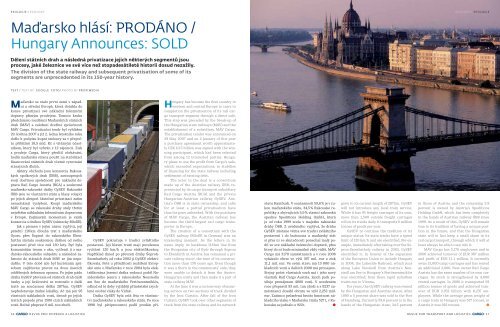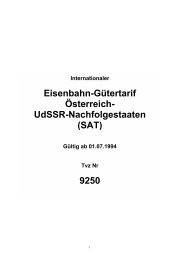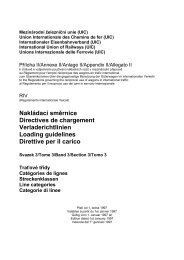Create successful ePaper yourself
Turn your PDF publications into a flip-book with our unique Google optimized e-Paper software.
EKOLOGIE / ECOLOGY<br />
Maďarsko hlásí: PRODÁNO /<br />
Hungary Announces: SOLD<br />
Dělení státních drah a následná privatizace jejich některých segmentů jsou<br />
procesy, jaké železnice ve své více než stopadesátileté historii dosud nezažily.<br />
The division of the state railway and subsequent privatisation of some of its<br />
segments are unprecedented in its 150-year history.<br />
TEXT / TEXT BY GOOGLE FOTO/ PHOTO BY PROFIMEDIA<br />
Maďarsko se stalo první zemí v západní<br />
a střední Evropě, která dotáhla do<br />
konce privatizaci své nákladní železniční<br />
dopravy přímým prodejem. Tomuto kroku<br />
předcházelo rozdělení Maďarských státních<br />
drah (MÁV) a založení dceřiné společnosti<br />
MÁV <strong>Cargo</strong>. Privatizační tendr byl vyhlášen<br />
29. května 2007 a již 2. ledna letošního roku<br />
došlo k podpisu kupní smlouvy za v přepočtu<br />
přibližně 10,5 mld. Kč s vítězným úč<strong>as</strong>tníkem,<br />
který byl vybrán z 12 zájemců. Zisk<br />
z prodeje Carga, který předčil očekávání,<br />
hodlá maďarská strana použit na stabilizaci<br />
fi nancování státních drah včetně vyrovnání<br />
stávajících dluhů.<br />
Aktéry obchodu jsou konsorcia Rakouských<br />
spolkových drah (ÖBB), z<strong>as</strong>toupených<br />
svojí dceřinou společností pro nákladní dopravu<br />
Rail <strong>Cargo</strong> Austria (RCA) a soukromé<br />
maďarsko-rakouské dráhy GySEV. Rakouské<br />
ÖBB jsou ve vl<strong>as</strong>tnictví státu a hl<strong>as</strong>y volající<br />
po jejich alespoň částečné privatizaci zatím<br />
nenacházejí vyslyšení. Koupí maďarského<br />
MÁV <strong>Cargo</strong> se rakouské dráhy staly třetím<br />
největším nákladním železničním dopravcem<br />
v Evropě. Zajímavým momentem je vznik<br />
konsorcia s dráhou GySEV (německy ROeEE).<br />
Jak z písmen v jejím názvu vyplývá, její<br />
páteřní 116 km dlouhá trať z maďarského<br />
Gyoru přes <strong>Š</strong>oproň do rakouského Ebenfurthu<br />
zůstala soukromou dráhou od svého<br />
postavení před více než 130 lety. Byť byla<br />
komunistům trnem v oku, vyčlenit ji z maďarsko-rakouského<br />
subjektu a následně zahrnout<br />
do státních drah MÁV se jim nepodařilo.<br />
V této době zde byl kuriózním způsobem<br />
zajišťován provoz na dvou úsecích<br />
oddělených železnou oponou. Po jejím pádu<br />
dráha GySEV převzala od státních drah další<br />
úseky a její království se rozrostlo o další<br />
tratě na souč<strong>as</strong>nou délku 287 km. GySEV<br />
nepředstavuje žádné lokálky. Ač má jen 95<br />
vl<strong>as</strong>tních nákladních vozů, denně po jejích<br />
tratích projede přes 1500 cizích nákladních<br />
vozů. Ročně přepraví 6 mil. tun zboží.<br />
GySEV pokračuje v tradici zvláštního<br />
postavení. Její hlavní tratě mají povolenou<br />
rychlost 120 km/h a jsou elektrifi kovány.<br />
Například ihned po převzetí dráhy <strong>Š</strong>oproň-<br />
Szombathely od roku 2002 ji GySEV elektrifi<br />
kovala. Poté u příležitosti rozšíření Evropské<br />
unie o Maďarsko v roce 2004 byla elektrifi<br />
kována Jezerní dráha vedoucí podél Neziderského<br />
jezera z rakouského Neusiedlu<br />
am See do maďarského Fertöszentmiklós,<br />
odkud od té doby vyjíždějí příměstské zrychlené<br />
osobní vlaky do Vídně.<br />
Dráha GySEV byla celá léta ve vl<strong>as</strong>tnictví<br />
maďarského a rakouského státu. Po roce<br />
1990 byl pětiprocentní podíl prodán pří-<br />
Hungary h<strong>as</strong> become the fi rst country in<br />
western and central Europe to carry to<br />
completion the privatisation of its rail cargo<br />
transport segment through a direct sale.<br />
This step w<strong>as</strong> preceded by the break-up of<br />
the Hungarian state railways (MÁV) and the<br />
establishment of a subsidiary, MÁV <strong>Cargo</strong>.<br />
The privatisation tender w<strong>as</strong> announced on<br />
29 May 2007 and on 2 January of this year<br />
a purch<strong>as</strong>e agreement worth approximately<br />
CZK 10.5 billion w<strong>as</strong> signed with the winning<br />
participant, which had been selected<br />
from among 12 interested parties. Hungary<br />
plans to use the profi t from <strong>Cargo</strong>’s sale,<br />
which exceeded expectations, to stabilise<br />
of fi nancing for the state railway including<br />
settlement of existing debt.<br />
The actor in the deal is a consortium<br />
made up of the Austrian railway ÖBB, represented<br />
by its cargo transport subsidiary<br />
Rail <strong>Cargo</strong> Austria (RCA) and the private<br />
Hungarian-Austrian railway GySEV. Austria’s<br />
ÖBB is in state ownership, and calls<br />
for at le<strong>as</strong>t a partial privatisation have<br />
thus far gone unheeded. With the purch<strong>as</strong>e<br />
of MÁV <strong>Cargo</strong>, the Austrian railway h<strong>as</strong><br />
become the third-largest rail cargo transporter<br />
in Europe.<br />
The creation of a consortium with the<br />
GySEV railway (ROeEE in German) w<strong>as</strong> an<br />
interesting moment. As the letters in its<br />
name imply, its backbone 116 km line from<br />
the Hungarian city of Győr through Sopron<br />
to Ebenfurth in Austria h<strong>as</strong> remained a private<br />
railway since\ the time of its construction<br />
more than 130 years ago. Even though<br />
it w<strong>as</strong> a thorn in the communists’ side, they<br />
were unable to detach it from the Austro-<br />
Hungarian entity and then make it a part of<br />
state railway MÁV.<br />
At the time it w<strong>as</strong> a curious way of ensuring<br />
service on two sections of track divided<br />
by the Iron Curtain. After fall of the Iron<br />
Curtain, GySEV took over other segments of<br />
track from the state railway and its network<br />
stavu Hamburk. V souč<strong>as</strong>nosti 59,6 % je v rukou<br />
maďarského státu, 34,5 % Rakouské republiky<br />
a zbývajících 5,9 % vl<strong>as</strong>tní rakouská<br />
spedice Speditions Holding GmbH, která<br />
je od roku 1999 zcela v majetku rakouské<br />
dráhy ÖBB. Z uvedeného vyplývá, že dráha<br />
GySEV zůstane věrna své tradici zvláštního<br />
postavení i do budoucna a maďarský stát<br />
si přes ni ve skutečnosti ponechal malý podíl<br />
ve své nákladní železniční dopravě, přes<br />
který do ní bude minimálně vždy vidět. MÁV<br />
<strong>Cargo</strong> má 3170 zaměstnanců a v roce 2006<br />
vykázalo obrat ve výši 367 mil. eur a zisk<br />
11,1 mil. eur. Ve svém stavu má 13 000 nákladních<br />
vozů a dalších 2000 má pronajato.<br />
Stejný počet vl<strong>as</strong>tních vozů má i jeho nový<br />
vl<strong>as</strong>tník Rail <strong>Cargo</strong> Austria. Jejich park posiluje<br />
pronájmem 4000 vozů. V uvedeném<br />
roce přepravil 93 mil. tun zboží a s 8237 zaměstnanci<br />
dosáhl obratu ve výši 2,252 mld.<br />
eur. Zatímco průměrná brutto hmotnost nákladního<br />
vlaku v Maďarsku činila 527 t, v Rakousku<br />
se jednalo o 922 t. ●<br />
grew to its current length of 287 km. GySEV<br />
will not introduce any local train service.<br />
While it h<strong>as</strong> 95 freight carriages of its own,<br />
more than 1,500 outside freight carriages<br />
roll on its tracks daily. It transports 6 million<br />
tonnes of goods per year.<br />
GySEV to continue the tradition of its<br />
unique status. Its main tracks have a speed<br />
limit of 120 km/h and are electrifi ed. For example,<br />
immediately after taking over the Sopron-Szombathely<br />
railway in 2002, GySEV<br />
electrifi ed it. In honour of the expansion<br />
of the European Union to include Hungary<br />
in 2004, the Lakeside Railroad, which runs<br />
along Lake Neusiedl from Austria’s Neusiedl<br />
am See to Hungary’s Fertöszentmiklós<br />
w<strong>as</strong> electrifi ed; from there rapid suburban<br />
trains run to Vienna.<br />
For years, the GySEV railway w<strong>as</strong> owned<br />
by the Hungarian and Austrian states. After<br />
1990 a 5 percent share w<strong>as</strong> sold to the Port<br />
of Hamburg. Currently 59.6 percent is in the<br />
hands of the Hungarian state, 34.5 percent<br />
ECOLOGY / EKOLOGIE<br />
in those of Austria and the remaining 5.9<br />
percent is owned by Austria’s Speditions<br />
Holding GmbH, which h<strong>as</strong> been completely<br />
in the hands of Austrian railway ÖBB since<br />
1999. As a result of this, GySEV will remain<br />
true to its tradition of having a unique position<br />
in the future, and that the Hungarian<br />
state will in fact keep a small share in its<br />
rail cargo transport, through which it will at<br />
le<strong>as</strong>t always be able to see into it.<br />
MÁV <strong>Cargo</strong> h<strong>as</strong> 3,170 employees and in<br />
2006 achieved turnover of EUR 367 million<br />
and profi t of EUR 11.1 million. It currently<br />
owns 13,000 cargo carriages and h<strong>as</strong> rented<br />
an additional 2,000. New owner Rail <strong>Cargo</strong><br />
Austria h<strong>as</strong> the same number of its own carriages.<br />
Its stock is strengthened by 4,000<br />
rented carriages. In 2006 it transported 93<br />
million tonnes of goods and achieved turnover<br />
of EUR 2.252 billion with 8,237 employees.<br />
While the average gross weight of<br />
a cargo train in Hungary w<strong>as</strong> 527 tonnes, in<br />
Austria it w<strong>as</strong> 922 tonnes. ●<br />
36 REVUE PRO DOPRAVU A LOGISTIKU<br />
REVUE FOR TRANSPORT AND LOGISTICS 37









